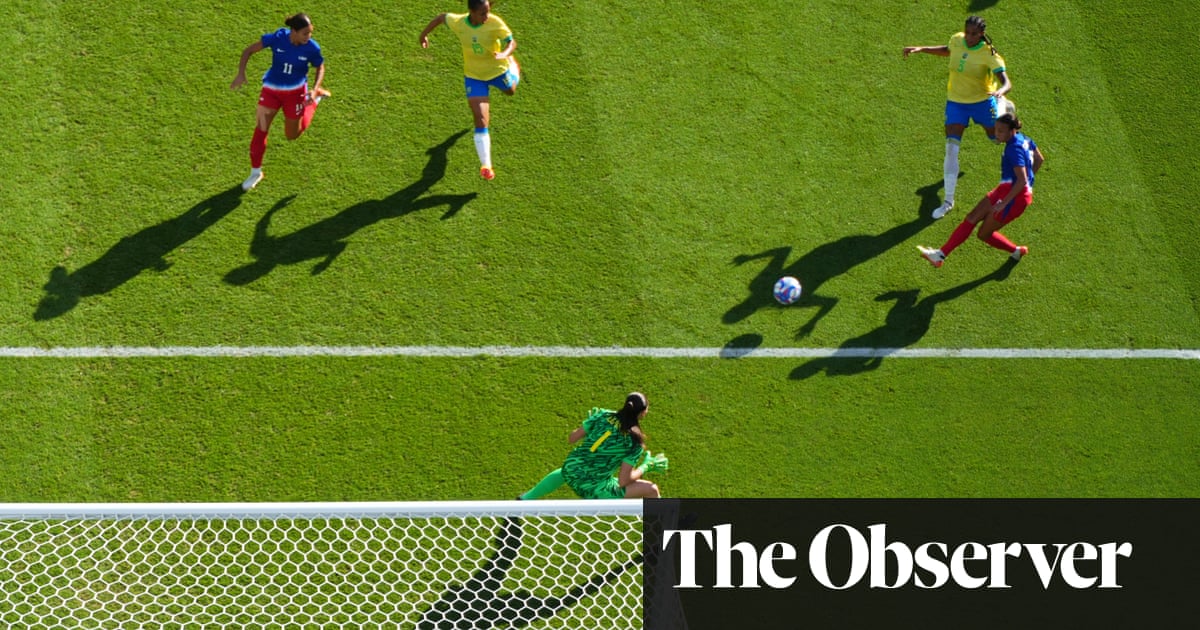

She checks her watch. She claps her hands. She points at things. She shouts at people. Trinity Rodman jogs past her on her way up the left touchline and she gives her a pat on the back. She is basically trying to convince herself that there are still jobs to do when, in fact, her work is done. We are deep into injury time, and Emma Hayes can no more influence this Olympic final than the fan in the Uncle Sam hat sitting 50 yards above her.
Finally, the whistle. The explosion. Hayes raises her arms, looks skywards, lets out a roar. It is, perhaps, the only moment of personal indulgence she will allow herself. While her victorious players are dancing in a huddle, Hayes has no interest in thrusting herself into the middle, a move known these days as the “Jorge Vilda”. Instead she walks towards the devastated Brazilian players, offers them a word of comfort, seeks out the retiring Marta to pay her respects.
Mission accomplished, then. And perhaps this was not a masterclass or an exhibition. Do not hang it in the Louvre. Victory by a single goal, which may have been offside, after getting schooled for the first 45 minutes and relying on two immense saves from Alyssa Naeher at the end of each half. And honestly: does any of this really shock you? What did you really expect when the most result-oriented coach in world football took on the most result-oriented nation in world football?
Well, this is what we got: a deadly finish from perhaps their only clear chance. Tactical fouling that frankly deserved an Olympic medal in its own right. And more intangibly an utter, unshakeable faith in their work, even when the walls are burning down and the fume of a million armchair fans feels like it has broken through the smartphone screen and is rattling the gates of the Parc des Princes.
Which is why, even as Brazil were ripping the US to shreds in that first half, it was impossible to shake the vision of Hayes on the touchline, in her trademark suit and trainers, looking as ever like the security detail at a Buckingham Palace garden party. You’ve dropped Rose Lavelle, a 107-cap national team legend in favour of a 20-year-old rookie. You can’t string two passes together. What are you seeing here that we are not seeing? Why won’t you change something?
It had been a long tournament, the games exhausting and squashed just a little too close together for comfort, the heat on this blanched Paris Saturday cloying and sticky, too hot for a high press, or really any sort of press. In a way this was a game that existed almost beyond tactics, the sort you get when you force footballers into places of extreme discomfort and see what happens.
Brazil had so many chances. The US midfield was swamped and sedated. Lindsay Horan and Korbin Albert, who stepped in for Lavelle, completed 17 out of 29 passes in that first half. Combined. Why won’t you change something? But the same team came out after the break and soon after that, a stroke of luck: Yaya, a pillar of Brazil’s midfield dominance, went off injured. “We want to play quickly!” screamed Hayes on the sidelines, and as Brazil slowly lost their grip it became clear that for all the continuity in personnel, Hayes had changed something.
after newsletter promotion
For 45 minutes, the famous triple espresso was tasting distinctly like decaf. Mallory Swanson, Sophia Smith, Trinity Rodman: lots of sacrificial runs up front, but also lots of exasperated pointing, and crucially not enough energy off the ball. After the break they were far more aggressive, buzzing and pressuring Brazil’s back four, and eventually they forced the mistake from Thais. Albert mopped it up, quickly released Swanson. Goal. The gold moment. A coach who knows that trophies are decided on slender details, and players with the talent to find them.
On came Marta in her farewell game, and of course every touch still oozed that old class. There was the classic feint where she took the ball on her left foot, opened up her body, and switched it back inside with the same foot, sending Albert home on the RER. But beyond that – and come on, Korbin, have you never seen Marta play before? – the Paris Saint-Germain midfielder was one of the best players in those closing stages, as unpalatable as that may sound to many.
And so 10 games was all it took for Hayes to leave her mark. Yet while this still feels like preamble, this was a title she badly needed. Defeat would have set her on the back foot from the start, raised legitimate questions about her suffer-ball style, about Rose Lavelle not getting a minute in the final, about Crystal Dunn at left-back, about the whole “program”. Instead she now has credit in the bank, buy-in from players and public.
There has been a lot of talk here about nail salons and karaoke, new vibes and new eras, a team rediscovering their joy after the calamities of last year. But Hayes is not a coach who has ever been interested in going on a holistic journey of healing and growth, in football as group therapy. The road to hell will not be strewn with rose petals. The only catharsis US football really needed, it turned out, was winning again.


